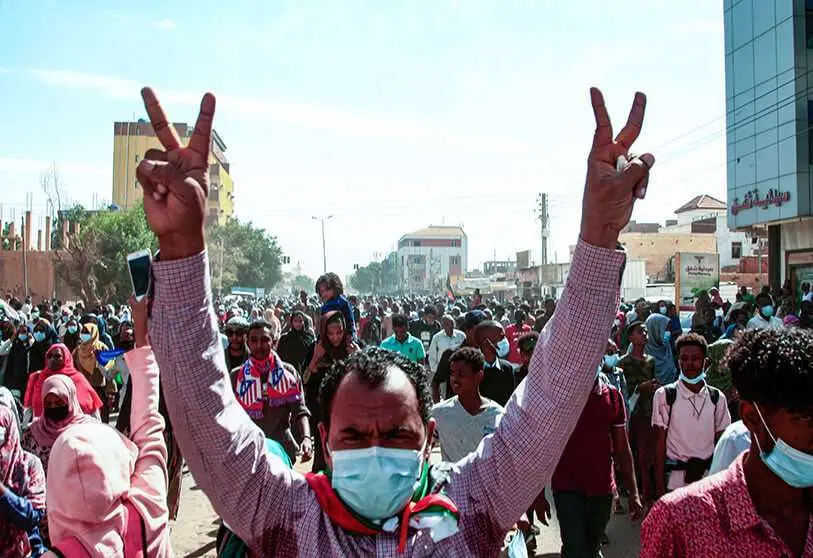Sudan prepares for new wave of protests against the army

The Sudanese people received a fresh call to take to the streets hours after the resignation of hitherto prime minister Abdalla Hamdok. The head of government resigned on Sunday in the face of a chronically paralysed political transition, hampered by the army. The scenes of violence in the streets, which have led to the deaths of more than 60 people since the outbreak of the protests and for which Hamdok himself feels responsible, reinforced his decision to step down. A new blow to Sudan's political chessboard.
The Sudanese security forces began preparations on Monday to armour the capital, Khartoum, in the face of what could be a new wave of mass protests against the government. With the step backwards by Hamdok, who had been the visible face of democratic openness, hopes of Sudan leaving behind a military regime are fading. And civil society is demanding to take control of the country to oust the army from power after three decades of military rule.

The closure of bridges and roads, reinforcement of troops and security perimeters for public buildings and the Presidential Palace in Khartoum. These are some of the measures intended to quell the wave of protests called on Tuesday by the Association of Sudanese Professionals and the Resistance Committees, organisations that were decisive in the overthrow of former president Omar Hassan al-Bashir in 2019. A deposition facilitated by the army, which gave the Islamist leader the final blow.
The harsh repression of the demonstrators by the security forces has marked the development of the demonstrations, despite Hamdok's continuous requests for the right to peaceful demonstration to be respected. The levels of violence have materialised in the form of arbitrary arrests, attacks on journalists and the media, and rapes of women during the demonstrations, as reported by the United Nations. A devastating balance.

In July 2019, the Forces for Freedom and Change and the Military Council joined forces after signing the transitional agreement. On paper, the civilian and military factions would share power until the election process scheduled for 2023, when the Sudanese would choose new civilian representatives. In practice, power remained in the hands of the army, whose visible head is General Abdel Fattah al-Burhan, although the government promoted some decisive changes.
Hamdok's cabinet repealed some of the most aggressive laws of al-Bashir's period and pushed forward his recovery agenda, to little avail. The country remains mired in a deep economic crisis, compounded by a health crisis and inter-communal divisions. A difficult horizon for optimism that emboldened a section of the army loyal to the former president to stage a coup d'état in September. The failed coup would not be the last; just a month later came the second.

The 25 October coup deposed Hamdok himself and placed him under house arrest. The action responded to the ambitions of the military wing of the government to discredit the civilian wing and monopolise power. However, pressure from the international community, which threatened to cut off funds to the Sudanese state if the coup persisted, made the army back down and force the return of the civilian leader to the head of the executive in order to reshape it and fill it with technocratic profiles.
Hamdok's return as head of government discredited his image in the eyes of the public. A large part of the demonstrators now perceive the 65-year-old economist as one of the main culprits in the failure of the transition, not only for having allowed, but also for having collaborated with the army's action. A situation that made it difficult for him to remain at the helm of the executive, aggravated by his inability to build a consensus between the military and the civilian opposition.

After learning of Hamdok's resignation, the self-proclaimed president of the Sovereign Council, Abdel Fattah al-Burhan, called for cohesion among the Sudanese people, putting aside partisan interests to conclude the political transition towards democratic elections. The army plans to form a new government with technocratic profiles, similar to the one led by Hamdok, according to al-Burhan. However, the army would be the only one involved in this process, and it does not have the legitimacy of civil society.
Another economist, Ibrahim Elbadawi, who headed the Ministry of Finance until 2020, is being touted as Hamdok's replacement, according to the Associated Press. However, the election of a new representative to head the civilian wing of the government seems complicated without the connivance of the social bases and political platforms. The transitional process would have to start all over again, as the rift between the two factions is more pronounced than ever. A turbulent return to square one.










